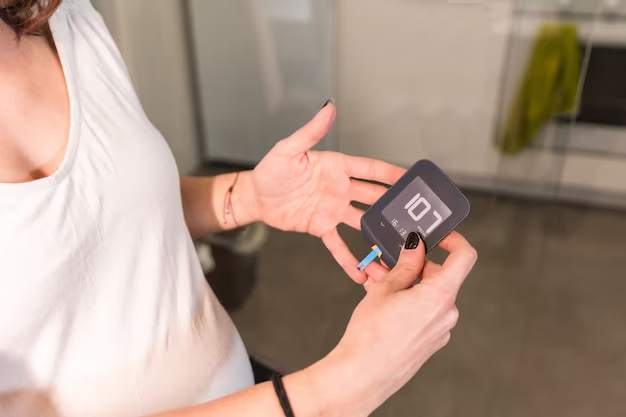Your Guide to What Is Symptoms Of Type 2 Diabetes
What You Get:
Free Guide
Free, helpful information about Diabetes FAQ and related What Is Symptoms Of Type 2 Diabetes topics.
Helpful Information
Get clear and easy-to-understand details about What Is Symptoms Of Type 2 Diabetes topics and resources.
Personalized Offers
Answer a few optional questions to receive offers or information related to Diabetes FAQ. The survey is optional and not required to access your free guide.
Recognizing the Symptoms of Type 2 Diabetes and What You Can Do
Type 2 diabetes is a chronic condition that affects millions globally, disrupting how your body metabolizes sugar. Identifying the symptoms of type 2 diabetes early can help manage the disease effectively and avoid complications. But what are these signs, and what steps should you take if you suspect you or a loved one might have this condition?
Common Symptoms of Type 2 Diabetes
The symptoms can be subtle at first and are often mistaken for other conditions, but knowing them can make a significant difference. Here are the key signs to watch for:
- Increased Thirst and Frequent Urination: High blood sugar levels pull fluid from your tissues, making you dehydrated and causing you to drink—and urinate—more often.
- Increased Hunger: Suddenly feeling ravenous can occur because your body isn't using insulin well, leading to a lack of energy that triggers hunger.
- Fatigue: When your cells are deprived of sugar, or insulin isn't effectively converting glucose into energy, fatigue sets in.
- Blurred Vision: High blood sugar levels can cause swelling in the eye lenses, affecting your ability to focus.
- Slow Healing of Sores and Frequent Infections: High sugar levels can hinder your body's ability to heal, causing even minor cuts and bruises to take longer to recover.
- Unexplained Weight Loss: Losing sugar through frequent urination can lead to weight loss.
- Tingling or Numbness in Hands or Feet: Known as neuropathy, this occurs as high blood sugar can damage nerves.
If you recognize several of these symptoms, consulting with a healthcare professional is crucial for a proper diagnosis and treatment plan.
Understanding the Wider Impact
Living with type 2 diabetes can be challenging, but financial stress should not be an additional burden. As medical expenses for managing chronic conditions mount, understanding available support can alleviate some of the pressure. Here’s how you can gain access to valuable financial and educational resources:
Financial Assistance Options
Government Aid Programs: Many governments offer healthcare assistance programs for chronic diseases. Checking eligibility for programs such as Medicaid or Medicare can provide needed relief.
Insurance Options: Ensure your health insurance plan includes comprehensive diabetes management coverage. This might include medication, equipment, and specialists.
Non-Profit Organizations: Several nonprofit organizations focus on providing financial assistance for diabetes care, including medication and advanced medical devices.
Prescription Assistance Programs: Pharmaceutical companies often have programs to help cover the cost of medications.
Addressing Education and Employment
Understanding and managing diabetes is a learning process:
Educational Grants: Some institutions offer grants or scholarships to those committed to diabetes awareness and research. This can be a pathway to rewarding changes in career focus and personal growth.
Workplace Rights: Depending on where you live, workplace accommodations for managing diabetes can include flexible hours or support for medical appointments without penalties.
By recognizing the symptoms of type 2 diabetes and knowing the financial and educational resources available, patients can manage their health while securing their financial stability.
Financial and Educational Resources for Managing Diabetes
🏥 Medicare/Medicaid: Check eligibility for coverage on insulin, testing supplies, and necessary medical services.
💊 Prescription Assistance Programs: Reduced-cost or free medication from manufacturers for those who qualify.
📚 Diabetes Research Grants: Financial aid for educational pursuits in health sciences related to diabetes.
🏢 Workplace Accommodations: Utilize rights to request flexible working hours and necessary leave for medical appointments.
📞 Non-Profit Support Hotlines: Access advice and resources from organizations dedicated to diabetes support.
Navigating type 2 diabetes can be daunting, but understanding the symptoms and having access to financial resources transforms lives positively. Stay informed, seek assistance, and take control of your health journey.
What You Get:
Free Diabetes FAQ Guide
Free, helpful information about What Is Symptoms Of Type 2 Diabetes and related resources.

Helpful Information
Get clear, easy-to-understand details about What Is Symptoms Of Type 2 Diabetes topics.

Optional Personalized Offers
Answer a few optional questions to see offers or information related to Diabetes FAQ. Participation is not required to get your free guide.


